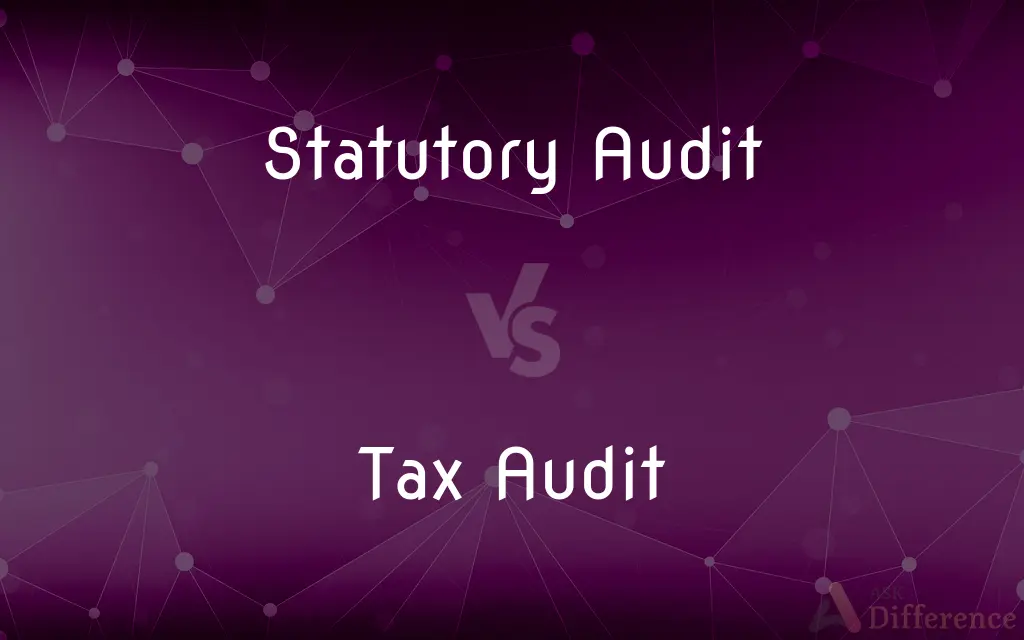Statutory Audit vs. Tax Audit — What's the Difference?
By Tayyaba Rehman & Fiza Rafique — Published on October 30, 2023
Statutory Audit is a legally mandated review of financial statements, while Tax Audit is an inspection of an individual's or firm's tax return to verify its accuracy.

Difference Between Statutory Audit and Tax Audit
Table of Contents
ADVERTISEMENT
Key Differences
Statutory Audit refers to an audit that is required by law, ensuring that an entity presents its financial statements accurately and fairly. On the other hand, Tax Audit is an examination of tax returns to check compliance with tax laws. Both serve as checks on financial practices, but for different purposes.
Statutory Audit is primarily concerned with providing an opinion on the truth and fairness of the financial statements. Tax Audit, in contrast, is specifically geared towards ensuring that taxpayers accurately report income and claim only permissible deductions. While a Statutory Audit provides an overall assurance to stakeholders, a Tax Audit ensures that taxpayers meet their tax obligations.
Statutory Audit is often conducted by external auditors who are independent of the entity being audited. Tax Audit can be conducted either by internal professionals or external specialists, depending on the jurisdiction. The purpose of Statutory Audit is to boost confidence in financial statements, whereas the goal of Tax Audit is to confirm tax compliance.
Statutory Audit ensures adherence to various financial regulations and accounting standards. In contrast, Tax Audit evaluates the correctness of tax returns in line with tax laws and regulations. Both are essential to maintain the integrity of financial systems and ensure transparency.
Comparison Chart
Purpose
Ensures accurate representation of financial statements.
Checks compliance with tax laws.
ADVERTISEMENT
Requirement
Mandated by law for certain entities.
Required for individuals/firms exceeding certain income.
Main Focus
Fairness and truthfulness of financial statements.
Accuracy of tax returns.
Conducted By
Typically external auditors.
Internal professionals or external specialists.
Outcome
Auditor's opinion on financial statements.
Verification of tax return accuracy.
Compare with Definitions
Statutory Audit
An assurance activity to uphold financial transparency and accountability.
After the Statutory Audit, shareholders were more confident about the company's finances.
Tax Audit
A review to ensure compliance with tax laws and regulations.
The businessman prepared thoroughly for his upcoming Tax Audit.
Statutory Audit
An examination of a company's financial statements as per the law.
The board discussed findings from the recent Statutory Audit.
Tax Audit
An inspection of an individual's or entity's tax return for accuracy.
Jane's high income triggered a Tax Audit by the IRS.
Statutory Audit
A legally mandated review to verify financial information's accuracy.
As per the legal requirements, the firm arranged for a Statutory Audit.
Tax Audit
A procedure to check the correctness of tax-related financial statements.
To avoid penalties, it's crucial to have accurate records for a Tax Audit.
Statutory Audit
A compulsory evaluation of financial records by external auditors.
The results of the Statutory Audit were favorable for the organization.
Tax Audit
An examination to determine correct tax amounts owed or refunded.
The Tax Audit revealed discrepancies in the company's reported expenses.
Statutory Audit
An audit required by governmental regulations.
The company underwent a Statutory Audit to meet regulatory requirements.
Tax Audit
A verification process to validate tax return claims.
False claims can lead to a more detailed Tax Audit.
Common Curiosities
What is a Statutory Audit?
A Statutory Audit is a legally mandated review of an entity's financial statements to ensure accuracy and transparency.
Who conducts a Statutory Audit?
Typically, an external independent auditor conducts a Statutory Audit.
Who can perform a Tax Audit?
Tax Audits can be conducted by internal professionals or external tax specialists, depending on jurisdictional requirements.
What is a Tax Audit?
A Tax Audit is an examination of an individual's or entity's tax return to verify its correctness as per tax laws.
Why is a Statutory Audit important?
It provides assurance to stakeholders regarding the accuracy and truthfulness of financial statements.
Can a Statutory Audit and Tax Audit happen concurrently?
Yes, both audits can occur simultaneously, but they serve different purposes.
Which entities require a Statutory Audit?
The requirement varies by jurisdiction, but typically larger corporations and public companies need a Statutory Audit.
What's the main outcome of a Statutory Audit?
The main outcome is the auditor's opinion on the fairness and truthfulness of the financial statements.
Is a Statutory Audit the same worldwide?
While the principle remains consistent, the specifics of a Statutory Audit may vary based on local regulations.
Does every business undergo a Statutory Audit?
No, only those businesses that meet certain criteria defined by local laws undergo a Statutory Audit.
How often is a Tax Audit conducted?
The frequency of a Tax Audit depends on various factors, including the taxpayer's income and any discrepancies in their returns.
Can one challenge the findings of a Tax Audit?
Yes, in most jurisdictions, there is a procedure to contest or appeal the findings of a Tax Audit.
Are Tax Audits only for businesses?
No, both individuals and businesses can be subject to a Tax Audit.
What are the consequences of discrepancies found in a Tax Audit?
Discrepancies can lead to penalties, interest charges, and sometimes legal actions.
How can one prepare for a Tax Audit?
Maintaining accurate and detailed financial records and understanding tax obligations are key to preparing for a Tax Audit.
Share Your Discovery

Previous Comparison
Intermediate Goods vs. Final Goods
Next Comparison
Cable vs. Satellite TVAuthor Spotlight
Written by
Tayyaba RehmanTayyaba Rehman is a distinguished writer, currently serving as a primary contributor to askdifference.com. As a researcher in semantics and etymology, Tayyaba's passion for the complexity of languages and their distinctions has found a perfect home on the platform. Tayyaba delves into the intricacies of language, distinguishing between commonly confused words and phrases, thereby providing clarity for readers worldwide.
Co-written by
Fiza RafiqueFiza Rafique is a skilled content writer at AskDifference.com, where she meticulously refines and enhances written pieces. Drawing from her vast editorial expertise, Fiza ensures clarity, accuracy, and precision in every article. Passionate about language, she continually seeks to elevate the quality of content for readers worldwide.












































